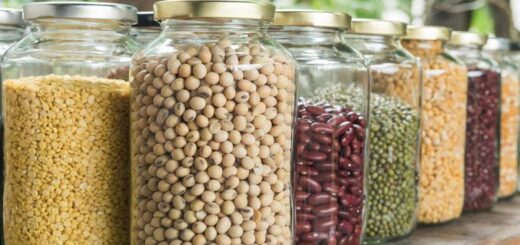What is Potassium: Potassium-Containing Foods | High and Deficiency

Potassium is an essential mineral for human survival. Just like its excess, its deficiency can lead to health problems. If you are one of the people who adopt natural products and live a healthy life as a principle, you should make sure that you take enough vitamins and minerals.
In this article, you can find all the information you want to learn about potassium, a valuable mineral for human health. You can find out what problems high and low potassium cause, what are the benefits and what are the potassium properties by reading the article.
What is Potassium?
Potassium is an essential mineral for the body to function regularly. Potassium deficiency and excess can pose a risk to human health and cause some discomfort. Excess potassium in the blood may be caused by an organ not working properly. The cause of this situation should be investigated and a solution should be found. Otherwise, it may cause unwanted problems.
Potassium is a mineral found in every cell of the body. Our body uses potassium to produce electricity that keeps cells working properly. In addition, potassium helps to keep the heartbeat in a certain rhythm. It regulates the osmotic pressure and acid-base balance of body fluids. It has vital tasks such as stimulating nerves, regulating blood pressure, helping muscle tissue to function properly.
What Are the Symptoms of Potassium High? Why does it rise?
High potassium in the blood may occur due to the inability of one of the organs in the body, most often the kidneys, to perform their functions. When the amount of potassium, which ensures the regular functioning of the cells, is more than necessary, the cells and muscles are damaged.
Potassium excess is not caused by a single cause. Drinking too much coffee during the day or overeating certain foods can also increase potassium levels. All tests need to be done and a diagnosis made to find the cause. Then treatment can be started.
Symptoms of high potassium in the blood can be listed as follows:
- Sudden vomiting may occur. Intense vomiting can also cause nausea.
- Persistent fatigue and weakness may occur. Extreme fatigue can lead to negative developments in people’s work, education and private life.
- Irregularities in the heart rhythm may occur. When potassium, which helps to regulate the heartbeat, reaches high levels, it can cause problems in heartbeat.
- High potassium can impair heart health and lead to cardiac arrest. It can cause more serious disorders, especially in people with heart conditions.
So, How Is It Treated?
Potassium elevation can be treated by applying a potassium diet. Foods containing potassium are prohibited in the diet to be made with the advice of a doctor. If the potassium level does not decrease and continues to rise despite the diet, the patient is referred to dialysis by his doctor. The blood is purified by dialysis treatment. After a while the problem goes away.
What Are the Symptoms of Potassium Deficiency?
Low potassium can be caused by many reasons. One of the factors that cause potassium deficiency is the use of drugs that remove fluid from the body (diuretic). These drugs cause potassium to be excreted from the body through urine. Deficiency may also occur as a result of diarrhea and vomiting.
Although not consuming potassium-rich foods is another reason, it is very rare. If the thyroid hormones increase with the overwork of the thyroid gland, it can cause potassium deficiency. Low potassium, which occurs in athletes who exercise intensely, is a natural condition. Lack of enough potassium in the body leads to impaired heart rhythm and respiratory failure. Muscle fatigue and general weakness are experienced. Since the transmission of impulses in the nerves is reduced, the muscles are also damaged.
Symptoms of potassium deficiency include:
- Weakness, muscle cramps and fatigue.
- Tingling, numbness in arms and legs.
- Cardiac arrhythmia, palpitations and serious complications in heart patients.
- Excessive urination, excessive thirst, and decreased or increased blood pressure.
- Constipation, cessation and obstruction of bowel movements in case of severe deficiency.
So, How Is It Treated?
The diagnosis of potassium deficiency can be made as a result of tests performed under the supervision of a doctor. Potassium supplements are given in the amount recommended by the doctor for low rates. The patient uses potassium medication. For high rates of deficiencies, intravenous potassium supplementation is given under the supervision of a doctor and in the hospital environment. This practice is done slowly, followed by a monitor.
List of Foods Containing Potassium
Normal levels of potassium in an adult person should be between 3.6 and 5.2 millimoles per liter of blood. When the level of potassium in the blood (2.5 mmol/l) decreases, it poses a risk to human life. It is a condition that requires medical attention.
You can find out which potassium-rich foods are from the list below:
- Beans: 100 grams of beans meet 13% of your daily potassium requirement.
- Potatoes: 1 medium size boiled potato contains 515 mg of potassium. This rate corresponds to 15% of your daily potassium requirement.
- Beetroot: 100 grams of boiled beetroot is enough to meet 9% of your daily potassium requirement.
- Spinach: 100 grams of boiled spinach meets 13% of your daily potassium requirement.
- Lentils: 100 grams of lentils are sufficient to meet 11% of your daily potassium needs and 19% of your iron needs.
- Mushrooms: 100 grams of mushrooms contain 318 mg of potassium. It is a protein-rich food that is among the sources of potassium.
- Dried Apricots: 65 g of dried apricots contain 755 mg of potassium. It meets 22% of your daily needs.
- Fat-Free Yogurt: Calcium-rich yogurt is also a potassium-rich source. 100 grams of fat-free yogurt meets 7% of your daily potassium requirement.
- Melon: 1 medium-sized melon corresponds to half of the daily potassium requirement.
- Salmon: Salmon and cold sea fish are among the sources of potassium. There are 630 mg of potassium in 100 grams of salmon.
- Tomato: 1 medium tomato contains 292 mg of potassium. It meets 8% of your daily needs.
- Carrot: 1 carrot corresponds to 6% of your daily potassium requirement.
- Banana: A banana weighing 118 grams contains 358 mg of potassium. It is the most well-known source of potassium among the society.
The list above is a list of foods that contain high potassium. In addition to these, we can list the following foods rich in potassium:
- Green vegetables and herbs such as vine leaves, chard, purslane, cabbage, parsley, arugula, lettuce, green beans, bell peppers.
- Dried vegetables and fruits.
- Kiwi, pomegranate, avocado, celery, artichoke, broccoli, cauliflower, okra, black-eyed peas and kidney beans.
- Milk, strawberries, fennel, Brussels sprouts, cauliflower, oranges, onions and asparagus.
What Are the Potassium Benefits? What Does It Do?
Too much or too little potassium in the body can cause many ailments. But without this mineral, it is not possible for the body to function regularly. It is an essential mineral for the continuity of life. The biggest benefit is that it ensures the continuity of life.
Potassium is a vital mineral for its benefits and contributions to the body:
- It is beneficial for bone health. It makes bones strong and durable. Having a normal level of potassium in the body is necessary for bone health.
- Potassium strengthens muscle tissues as well as bones. It helps to strengthen the body, prevents the weakening of the muscles. You can replenish your lost energy by consuming potassium-containing foods.
- Potassium is necessary for cell health and regular functioning of cells. Most of the potassium that should be in the body takes place in the cells. It is effective in protecting cells against harmful bacteria. Potassium helps to keep the oxygen level in the cells and the body at a healthy level.
- It is beneficial for maintaining nervous and mental health. Potassium deficiency negatively affects the nervous system and creates stress. Potassium’s duties include protecting the nervous system and mental health.
- Potassium allows the body to absorb fat and carbohydrates in a healthy way. Potassium is needed for healthy functioning kidneys and heart.











